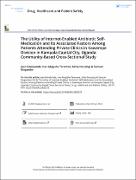| dc.contributor.author | Nakakande, Joan | |
| dc.contributor.author | Taremwa, Ivan Mugisha | |
| dc.contributor.author | Nanyingi, Miisa | |
| dc.contributor.author | Mugambe, Samuel | |
| dc.date.accessioned | 2023-05-18T15:28:02Z | |
| dc.date.available | 2023-05-18T15:28:02Z | |
| dc.date.issued | 2023-04-02 | |
| dc.identifier.citation | Nakakande, J., Taremwa, I.M., Nanyingi, M. and Mugambe, S., 2023. The Utility of Internet-Enabled Antibiotic Self-Medication and Its Associated Factors Among Patients Attending Private Clinics in Kawempe Division in Kampala Capital City, Uganda: Community-Based Cross-Sectional Study. Drug, Healthcare and Patient Safety, pp.85-91. | en_US |
| dc.identifier.issn | 1179-1365 | |
| dc.identifier.uri | http://hdl.handle.net/20.500.12280/3015 | |
| dc.description.abstract | Introduction: The expanding practice of internet-based antibiotic self-medication raises public health concerns as it increases
antibiotic resistance and introduces avoidable risks. This study aims to examine the utility of internet-enabled antibiotic selfmedication and its associated factors among patients attending private clinics in Kawempe division in Kampala Capital City, Uganda.
Methods: This was an analytical cross-sectional study that enrolled participants attending private clinics in Kawempe Division’s
randomly selected zones. These were interviewed using a structured questionnaire, and the data were analyzed using STATA version 12 software. Logistic regression analysis was used, and variables with p ≤ 0.05 were considered as significantly associated with internet-enabled antibiotic self-medication.
Results: Out of the 313 respondents, 246 (79%) reportedly had ever used internet sources to self-medicate with antibiotics. Factors such as being male; single; had knowledge of antibiotics; believed that Internet should be used for antibiotic self-medication; Distance to the nearest medical center/hospital from your residence/workplace of about 5 km and residing near a drug shop/pharmacy that gives antibiotics without a prescription increased internet-enabled antibiotic self-medication. Furthermore, the variables of more than three
household members; common practice of antibiotic self-medication in a household; did not agree that one can recover from the illness without a doctor’s prescription and medical workers who did not explain adequately the antibiotics medication given for the illness decreased internet-enabled antibiotic self-medication.
Conclusion: This study found that internet-enabled antibiotic self-medication practice is highly utilized and is associated with
a variety of individual, household, and healthcare system factors. This necessitates strict adherence to national drug policy regulations governing antibiotic use. Furthermore, community health education is critical in combating such medication practices. | en_US |
| dc.language.iso | en_US | en_US |
| dc.publisher | Taylor and Francis | en_US |
| dc.subject | Internet-enabled | en_US |
| dc.subject | antibiotics | en_US |
| dc.subject | antibiotic resistance | en_US |
| dc.subject | self-medication | en_US |
| dc.subject | Uganda | en_US |
| dc.title | The utility of internet-enabled antibiotic self-medication and Its associated factors among patients attending private clinics in Kawempe Division in Kampala Capital City, Uganda: community-based cross-sectional study | en_US |
| dc.type | Article | en_US |


